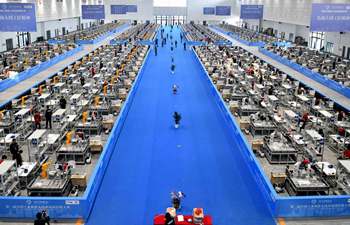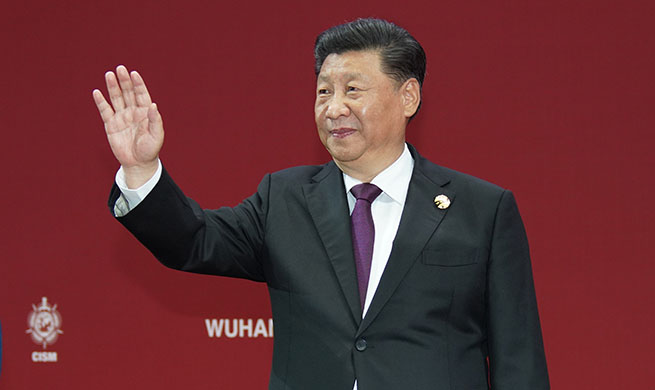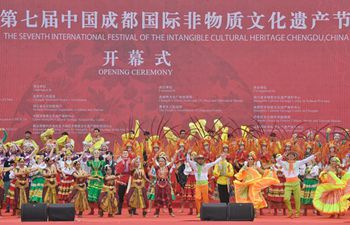TIANJIN, Oct. 19 (Xinhua) -- When one stands on a 26-meter-high tower nearby, a huge picture depicting a cartoon character with a thumb-up comes into view. It is actually made of paddy with different colors.
By planting with various types of paddy, a team from the Sinochem Agriculture "drew" several "paddy pictures" to celebrate this year's harvest in a demonstration farm in northern China's Tianjin Municipality.
Chen Wei, manager of a Tianjin-based technical service center affiliated to the Sinochem Agriculture, said the farm covers more than 20,000 mu (about 1,333 hectares) of paddy fields. It is expected to reap about 600 kg of rice per mu this year, up 40 percent year on year.
High-tech is the key to the yield increase. Based on precise planting and management techniques, the whole process of paddy growing from turning over the soil, fertilizing and transplanting to reaping has been mechanized and digitalized.
The farm adopted the unmanned aerial vehicle, unmanned transplanter, intelligent irrigation system and satellite remote sensing technology so that only about a dozen people are needed to manage the large paddy field.
For example, the intelligent irrigation system can monitor the salinity of water in real-time. When the collected data exceeds a certain level, the information will be transmitted to the management platform.
"Operators only need to click on the button to open the irrigation valves, and more water will flow into the field," Chen said, adding that operators can finish the series of operations in just a few seconds.
Moreover, operators can remotely control an unmanned transplanter, which can plan the path, reverse the direction, and transplant rice seedlings.
The LED screen in the service center displays the data and information on crop growth, precise agro-meteorological forecast, farming management, pest recognition, and quality tracing.
"We take advantage of technologies including the Internet of Things, artificial intelligence and cloud computing to collect information, with satellite remote sensing data updated every five days," Chen said.
In addition, if operators find pests and diseases in the paddy field, they upload photos to the platform via smartphones for experts to figure out solutions.
The service center also set up training classes for farmers to learn smart paddy planting techniques. "Up to now, we have trained about 1,000 villagers in the Wangwenzhuang Township where the farm is located," Chen said.
Li Tingfu, 65, said he once had to endure back pain after a day's hard work in paddy fields. However, with the new tech, the yield has increased remarkably. "We earn much more now," he said.
The farm also encouraged villagers to rear crabs, fish and frogs in paddy fields to increase their earnings.
During this year's National Day holiday from Oct.1 to 7, harvest-themed activities held in the township attracted about 150,000 visitors.
Yang Baohui, head of the township government, said they plan to develop an agri-tourism complex featuring paddy fields, wetland, recreational activities and shopping.
"For local residents, smart farming creates a way toward a better life," Yang said.

















